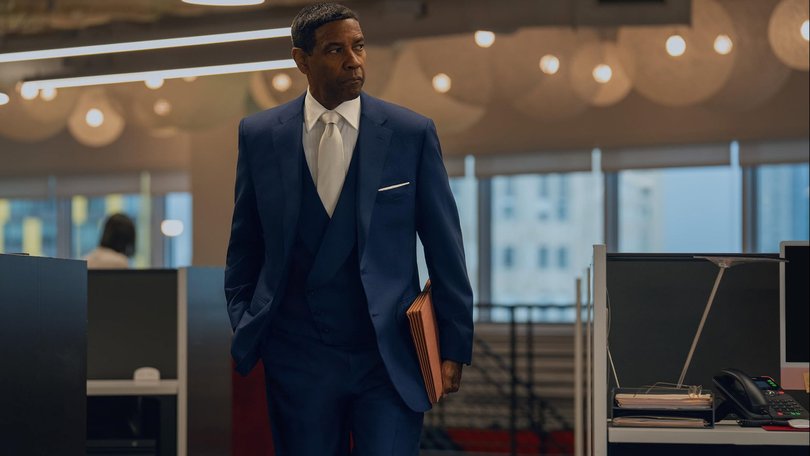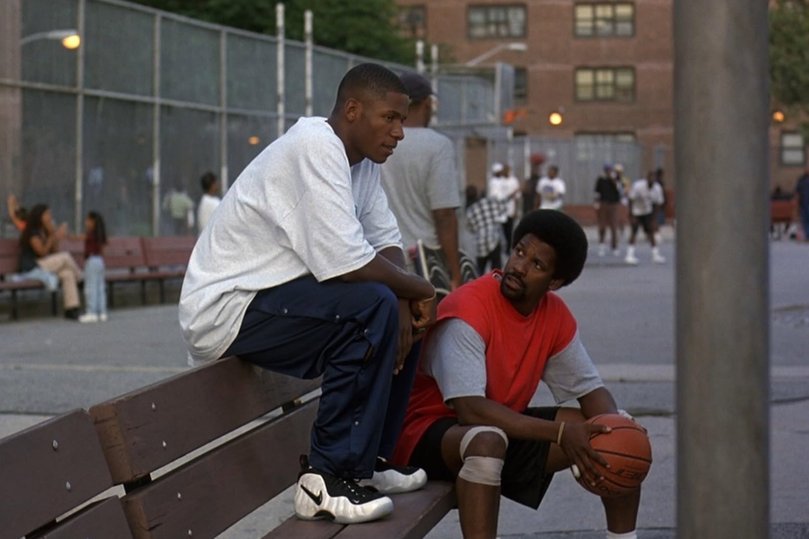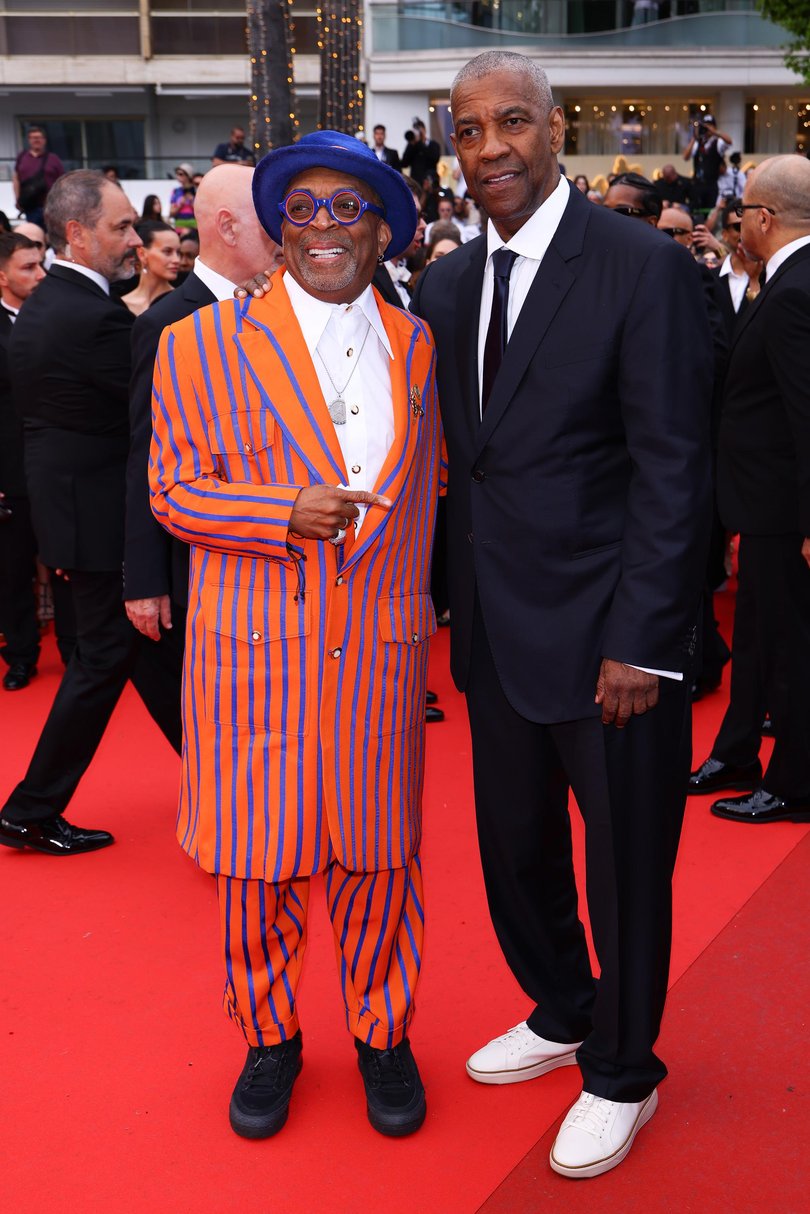Spike Lee on Denzel’s brilliance – ‘He’s Jordan’ – and the sports movie he’s dying to make
He Got Game might never get a sequel, but having the chance to spin the block once more with Denzel Washington in Highest 2 Lowest gave Spike Lee the chance to marvel at the actor’s brilliance

In the most pivotal scene of He Got Game,”the 1998 Spike Lee film starring Denzel Washington and future NBA Hall of Famer Ray Allen, the script called for basketball prodigy Jesus Shuttlesworth to defeat his father, Jake, 11-0, during a one-on-one showdown.
Washington, playing the role of Jake but drawing on his own background as a baller, wasn’t going to let that happen.
“Denzel said f... that,” Lee recalled this week with a laugh. “Forget about it. A zero doughnut?”
Sign up to The Nightly's newsletters.
Get the first look at the digital newspaper, curated daily stories and breaking headlines delivered to your inbox.
By continuing you agree to our Terms and Privacy Policy.“I got an ego like the next man,” Washington said this week in an interview. “He wasn’t beating me like that, no.”
Knowing that he was matched up with an acting novice in Allen, Washington, who played junior varsity basketball at Fordham and grew up playing with the likes of future NBA players Gus and Ray Williams in Mount Vernon, New York, set up his movie son by telling Allen that he struggled going left. Then when Lee called action, Washington drove left on Allen and scored. And he scored again. And again.
“I got in some lucky shots,” Washington said.
A confused Allen turned to Lee and did what any basketball player masquerading as a movie star would do in that situation.
“Instead of saying, ‘Cut,’ he’s like this,” Lee said, forming his hands like a letter ‘T,’ “‘Timeout! Timeout! Timeout! I’m supposed to win 11-zip.’”
Lee shrugged his shoulders, realising that a better scene was unfolding before his eyes. The tension increased every time Jake got buckets. Jesus eventually shut down Jake, but Washington got a moral victory, and He Got Game was elevated by a master’s intuition.

“He’s Jordan,” Lee said of Washington. “Are you going to put the clamps on Jordan? If you have Jordan, you’re not going to put the wraps on him. He got the green light. Everybody don’t get the green light, but my brother from Money Earnin’ Mount Vernon, he gets it.”
That kind of trust and respect is what has allowed Washington and Lee to team up for five films together — the most recent of which, Highest 2 Lowest, opens in theatres this weekend (September 5 on Apple TV for Australian audiences) for the first collaboration between the two in nearly two decades. The movie centres on music mogul David King, played by Washington, and the moral dilemma he faces when asked to pay a financially crippling ransom to save the life of his best friend’s kidnapped son.
“It was a New York story,” said Washington. “I said, ‘This is Spike.’ I trust him completely. He’ll do his New York thing and I’ll do what I do and I ain’t got to think about what he’s doing and he doesn’t have to worry about what I’m doing. I made a good decision. It was like going home.”
“You know that Donny Hathaway and Roberta Flack song, ‘Back Together Again’? That’s what it is,” Lee said of the reunion.
He Got Game remains the only feature in Lee’s four-decade filmography that can be classified as a sports movie. But sports iconography is as integral as the pulsating jazz scores to Lee’s movies: Bernard King references and Mars Blackmon’s obsession with Michael Jordan’s sneakers in his breakout film She’s Gotta Have It (1986). Mookie wearing a Jackie Robinson jersey and Buggin Out getting upset that a white man in a Larry Bird jersey stepped on his Jordan 4s in Do The Right Thing (1989). Scenes filmed at Yankee Stadium in Summer of Sam (1999). Lee’s passion for sports bleeds into most of his films.
Highest 2 Lowest continues the tradition, with former NBA star and He Got Game alum Rick Fox playing a college basketball coach where the kidnapping occurs, flashes of Alexander Van Armstrong’s painting of Joe Louis, and the ransom exchange taking place in the Bronx, near Yankee Stadium, where Yankees fans headed to the game holler, “Boston sucks!”
Lee is arguably the most famous supporter of New York teams and is rarely spotted in public without some combination of a Yankees cap, orange-and-blue Knicks apparel and exclusive Jordans (possibly the Spizike edition). For this interview, he’s wearing a Knicks hat and a Jordan brand T-shirt.
But in his movies, sports references go deeper than decoration. They give deep meaning to his characters and convey the tensions they encounter, often tied to the racial and cultural dynamics that permeate competition.
“It’s handed down from your father,” Lee said of his love of sports. “I was born in 1957. It was different in America. I’m of the generation where fathers took their kids to the sport events even before they could walk. My father, the late Bill Lee, great musician, loved sports. He loved New York teams. And I’m the first child, so big influence from my daddy.”

Lee has done documentaries and short films about sports heroes Jim Brown, Kobe Bryant and Mike Tyson. He produced the sports drama Love & Basketball. But the sports film that he’s been longing to make for nearly 20 years is Save Us, Joe Louis, a biopic that examines the heavyweight champion’s relationship with German rival Max Schmeling.
The two boxers met twice at Yankee Stadium: In 1936, with Schmeling knocking out the seemingly invincible Louis in the 12th round in a fight that Adolf Hitler used to support his belief in Aryan superiority, and in 1938, with the Brown Bomber destroying the Nazi propaganda with a first-round knockout. Lee has a script, co-written with Budd Schulberg, the Oscar-winning screenwriter of On the Waterfront. The movie’s completion would help Lee fulfill a promise he said he made at Schulberg’s deathbed, in 2009.
And one of the many movies that Lee was unable to make is a Jackie Robinson biopic starring Washington — and it’s a regret that runs deep. Lee grew up in Brooklyn, where the game and America were changed when Robinson integrated Major League Baseball, and the filmmaker’s love for Black baseball’s pioneers is so deep that he not only owns Josh Gibson’s catcher’s mitt but named his daughter after Negro Leagues legend Satchel Paige. Lee wrote the script in 1996, basing it on the Robinson autobiography, I Never Had It Made, and conversations with Robinson’s widow, Rachel. Finding funding was impossible, and it didn’t help that Washington — age 42 at the time — believed he was too old to handle the physical toll of the role.
“I grabbed my knees right away,” Washington said with a laugh. “Probably too old to slide. I got six knee surgeries that said no.”
“Sometimes your projects just don’t get made,” Lee said. “Jackie is one of my heroes. It was an epic film. I got to read that script again. I haven’t read it in a while.”
Lee said he is reminded of the cultural significance of He Got Game almost every time he’s at his court side seat cheering on the Knicks.
“People still want to remake it,” Lee said. “When (players) get a chance, they’re going to casually sneak over to me and say, ‘Yo Spike, what about that remake? Put me in.’ They don’t have to mention He Got Game, I know automatically what they’re talking about.”
He Got Game might never get a sequel, but having the chance to spin the block once more with Washington in Highest 2 Lowest gave Lee the chance to marvel at the actor’s brilliance. In another late-night clash similar to the one-on-one battle with Jake and Jesus, Washington finds himself in a recording studio with the man responsible for the kidnapping, Yung Felon, who is portrayed by rapper A$AP Rocky. During the confrontational encounter, Washington took off on an unscripted monologue, mixing lyrics from Nas, Tupac and DMX.
“Bars,” Lee said of the exchange. “Denzel did his thing, went into his Nas bag and broke out ‘Illmatic.’ A$AP Rocky went with the flow. I didn’t know. Rocky didn’t know. Beautiful move. Denzel flipped it and he just lifted the whole scene way up in the sky. When you lift the scene up, you’re lifting the movie up, too. That’s the intuition that Denzel has about it.”
